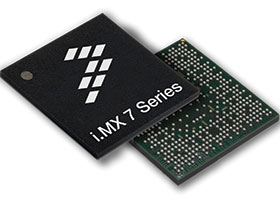

Freescale Semiconductor recently unveiled the i.MX 7 series, a new generation of power efficient and full featured applications processors based on its successful and broadly deployed i.MX platform. The i.MX 7 series delivers core power efficiency of 15,7 DMIPS/mW, a new Low Power State Retention mode (LPSR) of 250 W and the industry’s first general-purpose microprocessor family to incorporate both the ARM Cortex-A7 and the ARM Cortex-M4 cores.
These technologies, together with the new companion PF3000 power management IC (PMIC), address the market for innovative, secure and power efficient end products for the wearable computing and Internet of Things (IoT) eras.
The first members of the series are the i.MX 7Solo and i.MX 7Dual product families, which feature Cortex-A7 cores operating up to 1 GHz and a Cortex-M4 core operating up to 266 MHz. The Cortex-A7 and Cortex-M4 achieve processor core efficiency levels of 100 W /MHz and 70 W /MHz respectively. All of the cores can be individually power enabled to perform as needed.
This performance-on-demand architecture allows the i.MX 7 series to meet the bursty, high-performance needs of running Linux, graphical user interfaces, wireless stacks or other high-bandwidth data transfers with one or both of the Cortex-A7 cores. When high levels of processing are not needed, the work can be transferred to the smaller, lower powered Cortex-M4, enabling the power gating of the Cortex-A7 core.
Through the use of an advanced 28 nm ultra low-leakage process technology and discrete power domain architecture, the LPSR mode consumes only 250 W while supporting DDR self-refresh mode, GPIO wakeup and memory state retention.
These processors are ideal for a host of applications including wearables, secure point-of-sale (POS) equipment, smart home controls, industrial products and a vast array of innovative IoT solutions. The i.MX 7 series also continues Freescale’s support for the e-Reader market via integration of an advanced, fourth-generation EPD controller.
High-bandwidth connections are provided through a variety of interfaces such as PCIe and dual gigabit Ethernet with AVB support. Both of the new i.MX 7 processors support the performance and power driven range of external memories including eMMC5.0 and low-power DDR3, meeting higher bandwidth applications.
The PF3000 PMIC was developed in parallel with and optimised specifically for the i.MX 7 series to provide the highest possible overall system power efficiency. With up to four buck converters, six linear regulators, RTC supply and coin-cell charger, the device is engineered to support all specified i.MX 7 use cases and conditions.
The fully integrated PMIC enables system-level power efficiency by optimising power delivery not just to the processor, but also to peripherals and various types of system memory resources in an overall component solution size of less than 100 mm². It supports one-time programmable memory for controlling startup sequence and output voltages with no external components required.
The i.MX 7Solo and i.MX 7Dual will go into full production in November, while the PF3000 and two supporting development boards are available now.
For more information contact EBV Electrolink, +27 (0)21 402 1940, [email protected], www.ebv.com
| Tel: | +27 11 236 1900 |
| Fax: | +27 11 236 1913 |
| Email: | [email protected] |
| www: | www.ebv.com |
| Articles: | More information and articles about EBV Electrolink |
© Technews Publishing (Pty) Ltd | All Rights Reserved